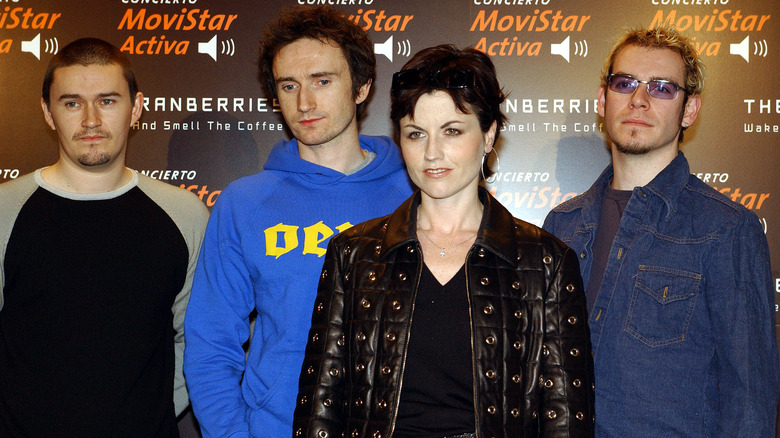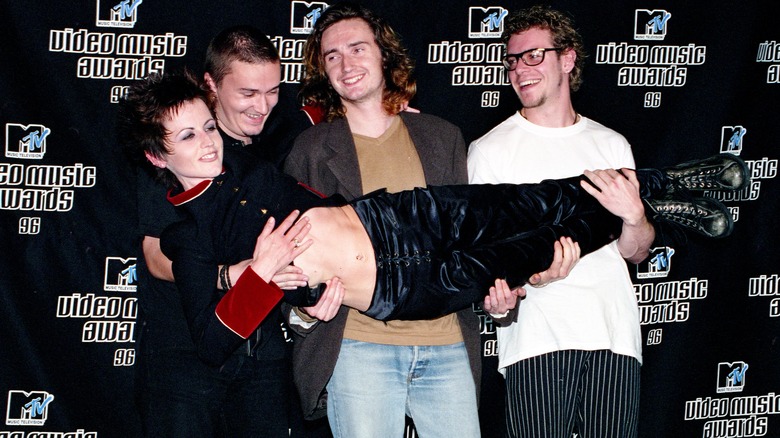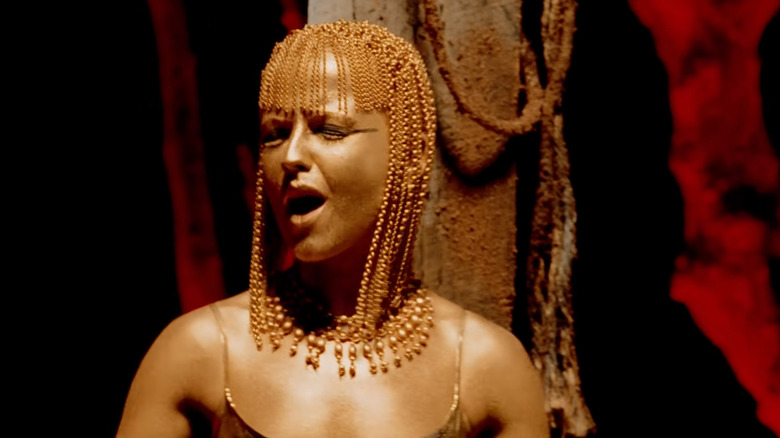The Untold Truth Of The Cranberries
Music transports the listener to a different place, a different plane of consciousness. In the case of the Cranberries, it's a reverie, as a person wanders into a lush soundscape of dreamy rock and the unmistakable voice of Dolores O'Riordan. Whether it's the buzzing poignancy of "Zombie" or the whimsical nostalgia of "Linger," the Irish rock group helped to shape the sound of the '90s in their own unique way and become one of the biggest bands in the world.
The trappings of success had a major impact on the Cranberries, particularly O'Riordan. This group never imagined themselves to be playing for more than a handful of merry people; however, they found themselves in the heat of a riot and dealing with the non-stop pressures of the music industry. Like many other bands before and after them, they had to rediscover their love and passion for music again after it became a business.
The Cranberries took a short hiatus in the early 2000s before reuniting once again to perform and release new music in 2012. However, after the death of O'Riordan in 2018, the band decided to release their final album, which featured her vocals, and officially disband. It was a bittersweet ending to the legacy, but isn't that exactly the same feeling their music evoked?
The Cranberries didn't envision much success
When most bands form, they dream of reaching the top of the music charts and becoming the greatest of all time. It's ambitious, sure, but if they aren't planning on conquering the world, what's the point of doing it in the first place? For the Cranberries, they never saw sold-out shows or iconic songs in their future. Instead, they harbored a far more humble outlook about their music career and where it could take them in the long run.
When Noel Hogan, his brother Mike Hogan, and Fergal Lawler formed the Cranberries, they looked to U2 as the great Irish hope but didn't think they would rise to that level of popularity. "If you thought Irish rock music, you thought U2, but that was way out of our reach," Noel told uDiscoverMusic." Coming from a small town in the south of Ireland, we thought no further than forming a band and playing a local club in front of a few friends if ever we got good enough. Really, we would have been content with that."
Noel added how when he, his brother, and Lawlor started the band, he didn't even know how to play guitar yet. That said, they had perseverance and a desire to learn, and it paid off for them in the end.
How the original lead singer shaped the band
Like Metallica and James Hetfield, it's impossible to think of the Cranberries without Dolores O'Riordan. Her vocals are so intertwined with the music to the extent it wouldn't be the same if someone else were to sing these songs. However, O'Riordan wasn't the first vocalist of the band; that honor belongs to Niall Quinn.
While Quinn might not be considered a major part of the band's history by the average fan, the Cranberries remain grateful to him for what he taught them in the early days. "A good thing about meeting Niall Quinn was he had experience in a band, and he kind of showed us how songs were structured and written," Noel Hogan told Cryptic Rock. "We actually had no idea: we bought instruments and started a band; we were really learning as we were going."
Quinn only stayed with the band for a short period of time between August 1989 and March 1990; however, he left on good terms and was responsible for connecting O'Riordan with the Cranberries. As Hogan explained, Quinn encountered Hogan a few months later and told him about his then-girlfriend's friend who wanted to perform original music. Hogan invited her to come try out with the band, and the rest is history.
How the Smiths producer forced them to think about music differently
In the world of British rock, the name Stephen Street is synonymous with the sound of many renowned bands. Street is particularly well known for his collaborations with the Smiths as a sound engineer and producer, while also working with Morrissey after he left the group and went solo.
The Cranberries received the opportunity to work with Street on their 1993 debut album, "Everybody Else Is Doing It, So Why Can't We?" As Noel Hogan revealed to Universal Audio, the experience changed the way they approached their music and kickstarted a long-term collaboration between the band and producer. "We did the first album in Dublin in six weeks," Hogan said. "Stephen taught us how to really concentrate on the song, and not worry so much about all the decoration that goes on around it."
Hogan explained how these sessions were where the Cranberries' sound was officially shaped, as Street forced them to hone then push the boundaries of their songwriting.
Dolores O'Riordan was overwhelmed by the initial success of the band
In terms of the debut album, the Cranberries' "Everybody Else Is Doing It, So Why Can't We?" proved to be the launching pad for major success. It peaked at number 18 on the Billboard 200 and delivered two of the band's most celebrated singles in the form of "Dream" and "Linger." From there, it was only onward and upward as the next two albums debuted higher on the charts, and the shows became larger and louder.
In a 2001 interview with Jon Wiederhorn, published by Yahoo years later, Dolores O'Riordan revealed how with great success came great stress at the time. "When the band were really big and we had massive hits, I was always stressed-out and insecure," she said. "I thought I wanted the band to be really popular, but when that happened there was so much pressure to keep it going."
O'Riordan explained how each new rung on the ladder of success brought with it additional pressures and anxiety. It was only after becoming a parent that she gained a different perspective on what mattered more to her in life. All of a sudden, she wasn't obsessed about what achievement is defined as in the music world and found a new sense of purpose in family.
How Linger proved to be a lucky charm
Ask any fan which song should be a staple part of any Cranberries' set and "Linger" — off 1993's "Everybody Else Is Doing It, So Why Can't We?" — is likely to receive a fair share of the votes. The melodious single sold over 500,000 units, being awarded gold by the Recording Industry Association of America (RIAA) in 1994.
Speaking to The Irish Times, Dolores O'Riordan and Noel Hogan discussed the origin and influence of "Linger." O'Riordan explained how it was the first song the Cranberries wrote together, while Hogan added how it consisted of the minimal guitar chords he could play at the time. In terms of the lyrics, the vocalist revealed how it was inspired by a real-life romantic experience then subsequent rejection in her life.
Despite the heartbreaking nature of the song, it was anything but for the band's success. As Hogan said, "The magnitude of 'Linger's' success was overwhelming. Michael Stipe came to the video shoot and the next thing we knew we were on tour with REM. I remember at this massive gig gazing out at 50,000 people and thinking: 'Not so long ago I was sat in my parents' kitchen."
The inspiration behind Zombie
In terms of which is the biggest song from the Cranberries, that accolade goes to "Zombie." It's proven to be a MTV Award-winning hit that's been sung at the Rugby World Cup and even covered by Bad Wolves. Yet, despite topping the charts in several countries, the lyrical content of the song is emotionally stirring.
As Dolores O'Riordan revealed to Songwriting, it was written during the era of the violent Troubles that plagued the United Kingdom, specifically around the incident where an IRA bomb strike claimed the lives of two children. "It was before the peace treaty and there had been a lot of trouble," she said. "There were a lot of bombs going off in London and I remember this one time a child was killed when a bomb was put in a rubbish bin — that's why there's that line in the song, 'A child is slowly taken.'"
O'Riordan was deeply impacted by the tragedy as well as taking influence from what she had experienced being Irish, so the anthem was birthed and became known as an anti-war and protest song in the years to come.
The show in which they played only one and a half songs
In 1995, at the peak of their popularity, the Cranberries set out to perform a free concert on the grounds of the Washington Monument. As per The Washington Times, the show got off to a rocky start as a support band took to the stage and the 10,000-strong crowd booed them, demanding to see the Cranberries instead. Half an hour later, the star attraction hit the stage and all was forgiven — albeit briefly.
Not long after the Irish rock band kicked into its second track "Linger," fans in attendance tried to climb up onto the stage. As a result, the Cranberries halted the performance. An MC headed out to speak to the audience and asked them to step back, which the majority did. However, the concert never continued, as the MC informed the crowd that the police didn't believe it to be safe to continue and the band had departed the venue.
The crowd didn't react kindly to the news. More police officers were called to diffuse the situation as members of the audience threw rocks at the authorities, trashed the venue, and even stole a custom guitar. Needless to say, this isn't one concert that "lingers" in the memory for the right reasons.
Dolores O'Riordan said she was pressured to not stop touring
In 1996, the Cranberries were in the midst of a massive world tour. The Irish rock outfit was scorching-hot at the time, with their albums selling fast and the demand to see them at an all-time high. Behind the scenes, though, Dolores O'Riordan struggled — both emotionally and physically. The singer explained how it seemed impossible to take a pause. "There was a hell of a lot of pressure because if I canceled the tour, it was going to cost something like £6 to 10 million," she told The Telegraph. "So basically it was like, 'You'll be OK! You can do it! You're not sick!'"
In a separate interview with The Irish Times, O'Riordan revealed how she was told by other parties that she couldn't cancel the tour because of contracts that were signed. With her physical and mental health deteriorating, she made the decision to stop the tour anyway — not even being sure if she would ever perform again. When O'Riordan broke the news to her bandmates, they were in complete support of her, as they were also feeling the grueling demands take a toll on their personal lives.
The band pulled the original Analyse music video
By the turn of the century, the Cranberries — as well as many other successful musicians from the '90s — lost traction among the general audience. Despite the charts being dominated by new names such as Limp Bizkit and Coldplay, the band continued to perform and release new music. October 2001 would see the Cranberries release the record "Wake Up and Smell the Coffee." One of the first singles from this album was "Analyse," which received an accompanying music video.
The "Analyse" video was released around the time of the 9/11 attacks, and it was quickly pulled from rotation on the music channels due to potentially triggering scenes in the video. Speaking to Irish America in 2002, the Cranberries drummer Fergal Lawler revealed the reason for this. He said, "VH1 had just started airing it when [9/11] happened. It had a lot of modern structures; some of them looked like the Twin Towers, and a lot of airplanes. It was just coincidence really."
A different version of the music video was created and released afterward. Lawler added how the band hadn't been happy with the original video in the first place, believing it to not connect with the actual song, and considered redoing it. In the end, they decided to do so in lieu of the world event that transpired.
Dolores O'Riordan's issues with the media
As the interest in the Cranberries grew, so too did the fascination around Dolores O'Riordan as the face of the band. She became a celebrity — whether she liked it or not. While already uncomfortable with the pressures of the rapid rise in the band's success, the singer also struggled with the constant attention on her own personal life. As she explained to The Irish Times in 1999, she couldn't fathom why she was being photographed at everything from the supermarket to her grandmother's funeral, as well as why publications were spreading false information about her life.
O'Riordan also revealed how she made herself public enemy number one after she walked out of an interview one time. "Then I just said, 'I'm not doing any press again' so I didn't have an opportunity to explain why I walked out of an interview and when you don't do press, the rumors just start flying," she said. "People used to go on about my money all the time, and where I was living and what I wore."
While the gossip around her life never disappeared altogether, O'Riordan appeared to ultimately handle it better than she had in the past.
The Cranberries will not replace Dolores O'Riordan
On January 15, 2018, the Cranberries singer Dolores O'Riordan died after drowning in the bath of her Park Lane Hilton hotel room. She was 46 years old. The news sent shockwaves throughout the music industry as fans, peers, and other figures paid tribute to her as both a person and a world-celebrated musician. At the time of the singer's death, O'Riordan was set to join the rest of her bandmates to record the new album they had been working on.
Expectedly, the attention soon turned toward the remaining members of the Cranberries, to find out if they would continue the band without O'Riordan. After all, it wouldn't be the first time that a popular band finds a replacement for their vocalist who has passed away.
Drummer Fergal Lawler refuted the idea entirely. "We're not going to be getting another singer and doing the Queen thing," he told The Telegraph. "No way. No way." The Cranberries understood that the band died with O'Riordan, but they don't fear ever being forgotten as their songs live on and prove to be timeless, as Noel Hogan revealed.
The final album was therapy
Dolores O'Riordan's death came at a time when the Cranberries were set to record a new album. The band had worked on the music, receiving vocal demos from her, and were about to enter the studio to lay down the record when tragedy struck. Speaking to MusicRadar, Noel Hogan revealed how it was O'Riordan's brother who broached the topic of the album at the funeral. Hogan admitted to him that he hadn't been able to listen to the demos yet because of the rawness of the event, but O'Riordan's brother expressed how important the album was to his sister before her passing.
The Cranberries agreed they would do it after consulting with O'Riordan's family and longtime producer Stephen Street. "In hindsight, I guess doing the album when we did, it was almost like therapy for us," Hogan said. "We realized that, 'This is how it's going to be ...' So I think it was right to do it when we did. If we were going in a year or two later, I don't think it would feel the same and we might not even do the album."
Hogan added how it wasn't easy to record the music, as the bandmates became emotional whenever they would hear O'Riordan's voice and often had to recompose themselves. The album titled "In the End" was released in April 2019, which earned the Cranberries their one and only Grammy Award nomination for Best Rock Album.












